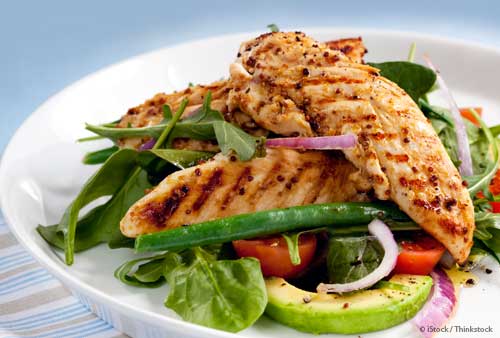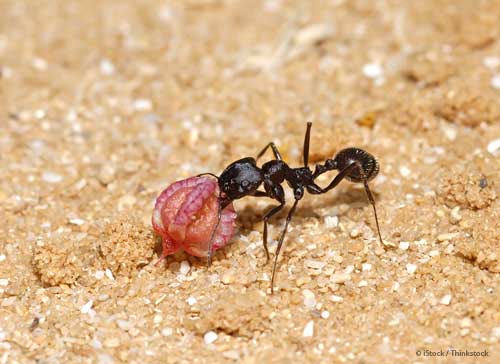The Beginner’s Guide to Intermittent Fasting
November 08, 2013 |
| Spread the Word to Friends And Family By Sharing this Article! | 109 | 2 |
The following article is written by guest columnist Steve Kamb, whose views may not precisely reflect those of my own. To review my recommendations on intermittent fasting (IF), see the recommended reading listing at the bottom of this page.
By Steve Kamb, NerdFitness.com
“…But Tony the Tiger tells us that breakfast is the most important meal of the day!” This rule has become so commonplace throughout the health and fitness community that it’s readily accepted as fact:“Want to lose weight? Make sure you start off with a healthy breakfast, so you can get that metabolism firing first thing in the morning! Eat breakfast like a king, lunch like a prince, and dinner like a pauper.”“Want to lose more weight? Make sure you eat six small meals throughout the day so your metabolism stays operating at maximum capacity all day long”.There are even studies that show those that eat earlier in the day lose more weight than those who ate later in the day or skipped a meal. So, eat breakfast to lose weight and obtain optimal health. Case closed…right?Maybe you’re not getting the whole story. As skeptics, what we need to ask: what if there’s science and research that promotes SKIPPING BREAKFAST (the horror! blasphemy!) for optimum efficiency, maximum muscle retention, and body fat loss?After firmly being on “Team Breakfast” for 28 years of my life, I’ve skipped breakfast for the past three months and might never go back to eating it. I want to share with you a concept about skipping breakfast (and other meals), and how your health will benefit as a result. . This is a topic that is very controversial, as it turns a LOT of conventional wisdom on its head. This is why this article is filled with more sources and citations than Jim Carrey’s glove compartment.
What is Intermittent Fasting?
Intermittent fasting is not a diet, but rather a dieting pattern. In simpler terms: it’s making a conscious decision to skip certain meals. By fasting and then feasting on purpose, intermittent fasting means eating your calories during a specific window of the day, and choosing not to eat food during the rest. Now, there are a few different ways to take advantage of intermittent fasting:
- Regularly eat during a specific time period. For example, only eating from noon-8 PM, essentially skipping breakfast. Some people only eat in a 6-hour window, or even a 4-hour window.
- Skip two meals one day, taking a full 24-hours off from eating. For example, eating on a normal schedule (finishing dinner at 8PM) and then not eating again until 8PM the following day.
Now, you might be thinking: “okay, so by skipping a meal, I just eat less than normally overall, and thus I will lose weight, right?” Well, that’s partly true. Yes, by cutting out an entire meal, you are able to eat MORE food during your other meals and still consume a caloric deficit (which is an important for losing weight). However, as we already know that not all calories all created equal, the timing of meals can also influence how your body reacts.
How Does Intermittent Fasting Work?
With intermittent fasting, your body operates differently when “feasting” compared to when “fasting”: When you eat a meal, your body spends a few hours processing that food, burning what it can from what you just consumed. Because it has all of this readily available, easy to burn energy in its blood stream (thanks to the food you ate), your body will choose to use that as energy rather than the fat you have stored. This is especially true if you just consumed carbohydrates/sugar, as your body prefers to burn sugar as energy before any other source.During the “fasted state,” your body doesn’t have a recently consumed meal to use as energy, so it is more likely to pull from the fat stored in your body, rather than the glucose in your blood stream or glycogen in your muscles/liver.Burning fat = win.The same goes for working out in a “fasted” state. Without a ready supply of glucose and glycogen to pull from (which has been depleted over the course of your fasted state, and hasn’t yet been replenished with a pre-workout meal), your body is forced to adapt and pull from the only source of energy available to it: the fat stored in your cells!Why does this work? Your body reacts to energy consumption (eating food) with insulin production. Essentially, the more sensitive your body is to insulin, the more likely you’ll be to use the food you consume efficiently, which can help lead to weight loss and muscle creation. Along with that, your body is most sensitive to insulin following a period of fasting.Your glycogen (a starch stored in your muscles and liver that your body can burn as fuel when necessary) is depleted during sleep (fasting), and will be depleted even further during training, which can further increase insulin sensitivity. This means that a meal immediately following your workout will be stored most efficiently: mostly as glycogen for muscle stores, burned as energy immediately to help with the recovery process, with minimal amounts stored as fat.Compare this to a regular day (no intermittent fasting). With insulin sensitivity at normal levels, the carbs and foods consumed will see full glycogen stores, enough glucose in the blood stream, and thus be more likely to get stored as fat. Not only that, but growth hormone is increased during fasted states (both during sleep and after a period of fasting). Combine this increased growth hormone secretion, the decrease in insulin production (and thus increase in insulin sensitivity), and you’re essentially priming your body for muscle growth and fat loss with intermittent fasting.The less science-y version: Intermittent fasting can help teach your body to use the food it consumes more efficiently. For many different physiological reasons, fasting can help promote weight loss and muscle building when done properly.
Why Does Every Health Book Say “Eat 6 Small Meals a Day”?
There are a few main reasons why diet books recommend six small meals:
- When you eat a meal, your body does have to burn extra calories just to process that meal. So, the theory is that if you eat all day long with small meals, your body is constantly burning extra calories and your metabolism is firing at optimal capacity, right? Well, that’s not true. Whether you eat 2000 calories spread out throughout the day, or 2000 calories in a small window, your body will burn the same number of calories processing the food. So, the whole “keep your metabolism firing at optimum capacity by always eating” sounds good in principle, but reality tells a different story.
- When you eat smaller meals, you’re less likely to overeat during your regular meals. I can definitely see some truth here, especially for people who struggle with portion control or don’t know how much food they should be eating. However, once you educate yourself and take control of your eating, I would argue most people find that eating six times a day is very prohibitive and requires a lot of effort. Along with that, because you’re eating six small meals, I’d argue that you probably never feel “full,” and you might be MORE likely to eat extra calories during each snack.
Although grounded in seemingly logical principles, the “six meals a day” doesn’t work for the reason you think it would (#1), and really only works for people who struggle with portion control (#2).If we want to think back to the caveman days, we’d have been in serious trouble as a species if we had to eat every three hours. Do you think Joe caveman pulled out his pocket sundial six times a day to consume his equally portioned meals? Hell no! He ate when he could, and his body adapted to still function optimally during the rest of the day. A recent study(highlighted by the New York Times) has done a great job of challenging the “six-meals-a-day” technique for weight loss. Martin from LeanGains points out two important quotes from the study:“…The premise underlying the present study was that increasing meal frequency would lead to better short-term appetite regulation and increased dietary compliance; furthermore, it was hypothesized that these predicted beneficial effects of increased meal frequency could have resulted from more favorable gut peptide profiles, potentially leading to greater weight loss. Under the conditions described in the present study, all three hypotheses were rejected.”“…We had postulated that increasing meal frequency would enhance the compliance to the energy restricted diet thus leading to greater weight loss, an effect possibly mediated by increased fullness. The present results do not support this hypothesis.”Remember, the type of food you eat matters. Meal frequency is not nearly as important as the quantity and quality of food consumed. This study reached similar conclusions.
Why Intermittent Fasting?
- Because it works. Although we know that not all calories are created equal, caloric restriction plays a central role in weight loss. When you fast (either for 16 hours per day, or 24 hours every few days), you are also making it easier to restrict your caloric intake over the course of the week. This will give your body a chance to lose weight as you’re simply just eating less calories than you were consuming before.
- Because it simplifies your day. Rather than having to prepare, pack, eat, and time your meals every 2-3 hours, you simply skip a meal or two and only worry about eating food in your eating window.
- It requires less time (and potentially money). Rather than having to prepare or purchase three to six meals a day, you only need to prepare two meals. Instead of stopping what you’re doing six times a day to eat, you simply only have to stop to eat twice. Rather than having to do the dishes six times, you only have to do them twice. Rather than having to purchase six meals a day, you only need to purchase two.
- It promotes stronger insulin sensitivity and increased growth hormone secretion, two keys for weight loss and muscle gain. This was already explained in the previous section with relevant sources, but intermittent fasting helps you create a double whammy for weight loss.
What are the Drawbacks of Intermittent Fasting?
In my own experimentation, I have found very few negative side effects with Intermittent fasting. The BIGGEST issue I’ve found, and the biggest concern most people have, is that intermittent fasting will lead to lower energy, focus, and the “holy crap I am hungry” feeling during the fasting period. People are concerned that they will spend all morning being miserable because they haven’t consumed any food, and thus will be miserable at work and ineffective at whatever task it is they are working on.Yes, the initial transition from EATING ALL THE TIME, to intermittent fasting can be a bit of a jolt to your system. However, once you get through the transition, your body can quickly adapt and learn to function just as well only eating a few times a day: This study explains that in participants after 48-hours of fasting, ”cognitive performance, activity, sleep, and mood are not adversely affected in healthy humans by two days of calorie-deprivation.”“So why do I feel grouchy when I’m not eating breakfast?” In this nerd’s humble opinion, a good portion of the grumpiness is a result of your eating habits. If you eat every three hours, your body will start to get hungry every three hours as it learns and becomes used to expecting (and receiving) food every three hours. If you eat breakfast every morning, your body is expecting to wake up and eat food.It turns out, quite a bit of it is mental.Once you retrain your body to NOT expect food all day every day (or first thing in the morning), these side-effects become less of an issue (thanks to a substance our bodies produce called Ghrelin). Think about it in caveman terms again. We certainly found ways to survive during periods of feast and famine, and that remains true today. It actually takes our bodies about 84 hours of fasting before our glucose levels are adversely affected. As we’re talking about small fasts (16-24 hour periods), this doesn’t concern us.AN IMPORTANT CAVEAT:Intermittent Fasting can be complex for people who have issues with blood sugar regulation, suffer from hypoglycemia, have diabetes, etc. If you fit into this category, I highly recommend you check with your doctor or dietitian before adjusting your eating schedule. I believe more research needs to be done for these particular cases and thus would recommend you do what works best for YOU
Can I Build Muscle and Gain Weight While Intermittently Fasting?
Absolutely!In fact, I have been intermittent fasting for the past three months or so while building muscle, with minimal increase to my body fat percentage. I still eat the same number of calories I was consuming before, but instead of eating all day long, I condense all of my calorie consumption into an eight hour window.
- 11 AM Work out with heavy strength training in a fasted state.
- 12 PM Immediately consume 1/2 of my calories for the day (a regular whole-food meal, followed by a massive Calorie Bomb Shake.)
- 7 PM Consume the second portion of my calories for the day in a big dinner.
- 8 PM – 12 PM the next day: Fast for 16 hours.
This method has been borrowed from one of the best resources on intermittent fasting and muscle building on the internet:Lean Gains. In a different method, my friend Nate Green packed on a crazy amount of muscle while fasting for a full 24 hours on Sundays. I’m not kidding when I say this has revolutionized how I look at muscle building and fat loss. Ultimately, this method flies in the face of the typical “bulk and cut” techniques of overeating to build muscle (along with adding a lot of fat) before cutting calories to lose fat (along with some muscle) and settling down at a higher weight. I prefer this method to the bulk-and-cut technique for a few reasons:
- There’s far less of a crazy swing. If you are putting on 30 pounds and then cutting 25 to gain 5 lbs of muscle, your body is going through drastic swings of body mass. Your clothes will fit differently, you’ll have different levels of definition, and your body will wonder what"s going on.
- You’re consuming less food and thus spending less money. Rather than overeating to put on 1 pound of muscle and 4 pounds of fat in a week or two, you’re aiming to eat exactly enough to put on 1 pound of muscle without adding much fat on top of it. Yeah, it’s a delicate balance, but there’s far less swing involved. You are just slowly, steadily, and consistently building muscle and strength over many months.
- There’s never a need to get “vacation-ready”: we all want to look good naked, right? When you are just adding muscle, you don’t need to worry about getting your body ready before by drastically altering your diet (going on a miserable crash diet for a month). I like Anthony Mychal’s technique of never being more than two weeks away. Keep your body fat percentage low, build strength and muscle, and if you happen to notice your body fat creeping up, cut back on the carbs. Within two weeks you should be back at your preferred body fat percentage and can continue the muscle building process.
Does Intermittent Fasting have Different Effects on Men and Women?
Yes, intermittent fasting does affect men and women differently. This article over on Paleo For Women goes extensively into the negative effects of intermittent fasting for women. This article on Mark’s Daily Apple does a fantastic job of breaking down the differences between men and women and how they are affected by intermittent fasting, ultimately explaining:
- “One study, which I’ve cited before as evidence of a benefit to fasting, found that while IF improved insulin sensitivity in male subjects, female subjects saw no such improvement. In fact, the glucose tolerance of fasting women actuallyworsened. Ouch.
- Another study examined the effect of alternate day fasting on blood lipids. Women’s HDL improved and their triglycerides remained stable; men’s HDL remained stable and their triglycerides decreased. Favorable, albeit sex-specific results.
- Later, both obese men and women dropped body fat, body weight, blood pressure, total cholesterol, LDL cholesterol, and triglyercides on a fasting regimen. These people were obese, however, and perimenopausal women were excluded from the study, so the results may not apply to leaner people or women of reproductive age.”
Long story short: Yes, men and women will have different experiences with intermittent fasting; we’re all unique snowflakes (yep, even you), and your body will be affected by intermittent fasting differently than the person next to you. My best advice? Give it a shot, track your results, and see how things go!
Commonly Asked Questions About Intermittent Fasting
“Won’t I get really hungry?” As explained above, this is generally a result of the habits you have built for your body. If you are constantly eating or always eat the same time of day, your body can actually learn to prepare itself for food by beginning the process of insulin production and preparation for food. After a brief adjustment period, your body can adapt to the fact that it’s only eating a few times a day.Remember, your body’s physical and cognitive abilities aren’t diminished as a result of fasting. “Where will I get my energy for my workouts? Won’t I be exhausted and not be able to complete my workouts if fasting?” This was a major concern of mine as well. And for my first workout or two, it was very weird to not eat a heavy carb meal before training. However, after a few sessions, I learned that my body could certainly function (and even thrive) during my training sessions despite not eating a pre-workout meal. As Mark’s Daily Apple states:Fasted training can actually result in better metabolic adaptations (which mean better performance down the line),improved muscle protein synthesis, and a higher anabolic response to post-workout feeding (you’ll earn your meal and make more muscle out of it if you train on an empty stomach).That being said, I’m currently experimenting with a pre-workout BCAA supplement to see the effect it has on muscle creation. So far, so good, though I’m not sold on the necessity of the supplement yet. I’ll keep you posted. “I like the idea of fasted training, but I work a regular 9-5 and can’t train at 11AM. What am I supposed to do?”Martin from LeanGains lays out a few different options for you, depending on your training schedule. The best advice is to not freak out and overanalyze unless you are an elite athlete concerned with the absolute optimal performance at all time. If you’re just a normal guy or gal looking to drop a few pounds and get stronger, do the best you can. “Won’t fasting cause muscle loss?”Another big concern of mine, but it turns out…it was unfounded. We’ve been told by the supplement industry that we need to consume 30 g of protein every few hours, as that’s the most amount of protein our body can process at a time. Along with that, we’ve been told that if we don’t eat protein every few hours, our body’s muscle will start to break down to be burned as energy.Again, NOT TRUE! This study shows that our bodies are quite adept at preserving muscle even when fasting, and it turns out that protein absorption by our body can take place over many many many hours. Protein consumed in a shorter period of time has no difference on the body compared to protein spread throughout the day. “What about my body going into starvation mode from not eating?”Now, the thought process here is that when we don’t feed ourselves, our bodies assume calories aren’t available and thus choose to store more calories than burning them, eliminating the benefits of weight loss with fasting. Fortunately, this is NOT true. As Martin from LeanGains so eloquently explains (as you can tell, he’s good at this stuff):“The earliest evidence for lowered metabolic rate in response to fasting occurred after 60 hours (-8% in resting metabolic rate). Other studies show metabolic rate is not impacted until 72-96 hours have passed.Seemingly paradoxical, metabolic rate is actually increased in short-term fasting. For some concrete numbers, studies have shown an increase of 3.6% – 10% after 36-48 hours (Mansell PI, et al, and Zauner C, et al). Epinephrine and norepinephrine (adrenaline/noradrenaline) sharpens the mind and makes us want to move around. Desirable traits that encouraged us to seek for food, or for the hunter to kill his prey, increasing survival. At some point, after several days of no eating, this benefit would confer no benefit to survival and probably would have done more harm than good; instead, an adaptation that favored conservation of energy turned out to be advantageous.”“This sounds crazy, I’m not gonna do it.” That’s cool. Are you losing body fat, building muscle, and getting a clean bill of health from your doctor? If you can say yes to those things, AWESOME. Keep doing what you’re doing, because it’s working. However, if what you’re doing ISN’T working, or you’re not getting the results you were hoping for, why not give it a chance? Hopefully the dozens of studies at least peak your curiosity. Self-experimentation is the best way to determine WHAT methods work for you.
Tips and Tricks about Fasting
Don’t freak out. Stop wondering: “can I fast 15 hours instead of 16?” or “what if I eat an apple during my fasted period, will that ruin everything?” Relax. Your body is a finely tuned piece of machinery and learns to adapt. Everything is not as cut and dry as you think. If you want to eat breakfast one day but not another, that’s okay. If you are going for optimal aesthetic or athletic performance, I can see the need to be more rigid in your discipline, but otherwise… chill out and don’t stress over minutiae.Expect funny looks. A few weeks back I had a number of friends staying with me, and they were all completely dumbfounded when I told them I didn’t eat breakfast anymore. I tried to explain it to them but received a bunch of blank stares. Breakfast has become so engrained in our culture that NOT eating it sounds crazy. You will get weird looks from those around you…embrace it. Stay busy. If you are just sitting around thinking about how hungry you are, you’ll be more likely to struggle with this. For that reason, I time my fasting periods for maximum efficiency and minimal discomfort:
- My first few hours of fasting come after consuming a MONSTER meal, where the last thing I want to think about is eating.
- When I’m sleeping: 8 of my 16 hours are occupied by sleeping. Tough to feel hungry when I’m dreaming about becoming a Jedi.
- When I’m busy: After waking up, 12 hours of my fasting is already done. I spend three hours doing my best work (drinking green tea and listening to PM, which is exactly what I’m doing while writing this article!), and then comes my final hour of fasting: training.
I don’t have time to think about how hungry I am, because I keep my brain constantly occupied! Zero-calorie beverages are okay. As previously stated, I drink green tea in the morning for my caffeine kick while writing. If you want to drink water, black coffee, or tea during your fasted period, that’s okay. Remember, don’t overthink it – keep things simple! Track your results, listen to your body:
- Concerned about losing muscle mass? Keep track of your strength training routines and see if you are getting stronger.
- Buy a cheap set of body fat calipers and keep track of your body fat composition.
- Track your calories, and see how your body changes when eating the same amount of food, but condensed into a certain window.
Everybody will react to intermittent fasting differently; I can’t tell you how your body will react. It’s up to you to listen to your body and see how making these adjustments change your body. Don’t expect miracles. Yes, intermittent fasting can potentially help you lose weight, increase insulin sensitivity and growth hormone secretion (all good things), but it is only ONE factor in hundreds that will determine your body composition and overall health. Don’t expect to drop to 8% body fat and get ripped just by skipping breakfast. You need to focus on building healthy habits, eating better foods, and getting stronger.This is just one tool that can contribute to your success…
To Sum it All Up...
Intermittent fasting can potentially have some very positive benefits for somebody trying to lose weight or gain lean body mass. Men and women will tend to have different results, just like each individual person will have different results. The ONLY way to find out is with self-experimentation. There are multiple ways to “do” intermittent fasting:
- Fast and feast regularly: Fast for a certain number of hours, then consume all calories within a certain number of hours.
- Eat normally, then fast 1-2x a week: Consume your normal meals every day, then pick one or two days a week where you fast for 24 hours. Eat your last meal Sunday night, and then don’t eat again until dinner the following day.
- Fast occasionally: probably the easiest method for the person who wants to do the least amount of work. Simply skip a meal whenever it’s convenient. On the road? Skip breakfast. Busy day at work? Skip lunch. Eat poorly all day Saturday? Make your first meal of the day dinner on Sunday.
Remember: One of the Rules of the Rebellion is to QUESTION EVERYTHING. If this seems like something you’d like to try, give it a shot. If it sounds crazy to you, ask yourself why you think it sounds crazy, and do your own research and experimentation before condoning/condemning it.
About the author
Steve Kamb is the creator and owner of NerdFitness.com - a fitness community dedicated to helping nerds, desk jockeys, and average Joes level up their lives. In just over four years, Steve has taken Nerd Fitness from a simple one-man blog and developed it into a passionate “Rebellion” of over 100,000 loyal members and over one million monthly visitors.While running Nerd Fitness from his laptop, Steve has exercised and adventured all over the world, exploring the ruins of Machu Picchu and Angkor Wat, diving with sharks on the Great Barrier Reef, hiking the Great Wall of China, living like James Bond in Monte Carlo, tracking animals in South Africa, and guest lecturing at Facebook, Google, and TEDxEmory.
Recommended Reading List:
....................
.......,,.............










No comments:
Post a Comment